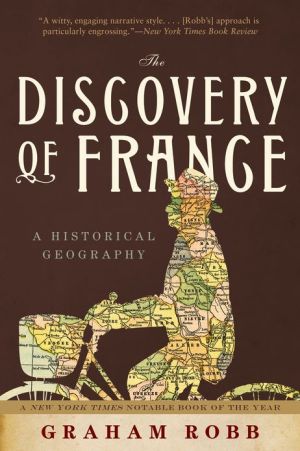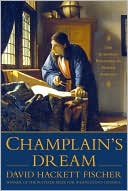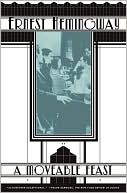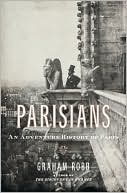The Discovery of France: A Historical Geography, from the Revolution to the First World War
"A witty, engaging narrative style....[Robb's] approach is particularly engrossing."—New York Times Book Review, front-page review\ A narrative of exploration—full of strange landscapes and even stranger inhabitants—that explains the enduring fascination of France. While Gustave Eiffel was changing the skyline of Paris, large parts of France were still terra incognita. Even in the age of railways and newspapers, France was a land of ancient tribal divisions, prehistoric communication...
Search in google:
"A witty, engaging narrative style....[Robb's] approach is particularly engrossing."—New York Times Book Review, front-page review The Barnes & Noble Review Graham Robb wants you to see France -- not the country you think you know, the one with the Louvre, the existentialism, the sublime cuisine, and the fashion sense. Nor the picturesque version of laid-back life in Provence made famous by Peter Mayle et al. The author of award-winning biographies of Balzac and Rimbaud explores a truly unknown country in The Discovery of France: A Historical Geography from the Revolution to the First World War. On bicycle (enabling a horse-bound traveler's perspective), the author meanders through the French landscape spatially, while his deeply researched book dives backward in time, recovering with a sense of wonder France's assemblage of wildly diverse "tribes." He gives us a nation of competing languages, of wild wastes and prehistoric rituals, where wolves were still a danger to village people in Dordogne at the turn of the 20th century. Most winningly, Robb's France is a mosaic of indelible images and still-resonant tales: stilt-walking shepherds in the Landes; a rock-ledge hamlet in the Pyrenees where the dead were lowered by ropes to the valley below; and the strange, moving saga of the cagots, a persecuted "caste" whose ethnic identity remains a historical mystery. Connecting the plight of the cagots to the later effects of anti-Semitism (and modern French controversies over Islamic "assimilation"), Robb proves that his tour of the vast countryside of the past inevitably winds up returning us -- wiser or not -- directly to the present. --Bill Tipper
\ William GrimesFrance, in this brilliant work of history seen from the margins, dissolves under close inspection into a vast cabinet of curiosities, an endless series of counter examples to the myth of a culturally unified nation and people…France was a land of marvels, with each region, and each village within each region, culturally and linguistically isolated from the rest of the country but interconnected economically by an ancient network of trails and commercial ties. Mr. Robb, who writes beautifully, unravels these connecting threads, highlights differences and traces the long, slow process of centralization that has erased most of the cultural differences he describes and changed the very landscape itself…Mr. Robb has accomplished quite a feat. He has reintroduced France to itself.\ —The New York Times\ \ \ \ \ Caroline WeberWritten as a "social and geographical history" in which "'France' and 'the French' would mean something more than Paris and a few powerful individuals," The Discovery of France draws its material not just from the usual array of scholarly sources, but from the author's own back-road explorations on his bicycle. ("This book," Robb notes, "is the result of 14,000 miles in the saddle and four years in the library.") Such an approach is particularly engrossing when one remembers that the very geographical concept of France was still, in the 18th century, very much in flux.\ —The New York Times Book Review\ \ \ Publishers WeeklyFrance is often regarded as the center of elegant civilization, so it's surprising to find that as late as 1890, most of the population was far from civilized-outside the confines of sophisticated Paris, as noted biographer Robb explains in his riveting exploration of France's historical geography, great swathes of countryside were terra incognita: dark places inhabited by illiterate tribes professing pre-Christian beliefs and lethally hostile to outsiders. They spoke not French but regional dialects; much of the country had not been accurately mapped; and many in the rural areas lacked surnames. The author himself embarked on a 14,000-mile bicycle tour of the France passed over in tourist guides. The result is a curious, engrossing mix of personal observation, scholarly diligence and historical narrative as Robb discusses the formation of both the French character and the French state. Robb's biographies of Victor Hugo, Rimbaud and Balzac were all selected by the New York Timesas among the best books of the year, an accolade that assures a select readership will be eager to pack his newest alongside their Michelin guides. 8 pages of b&w illus, maps. (Oct.)\ Copyright 2007 Reed Business Information\ \ \ \ \ Library JournalThis is a difficult yet intriguing book that should be appreciated by academic specialists in French culture and history. Acclaimed biographer Robb (Victor Hugo: A Biography) aims to demonstrate that France remains a land of contrasts and mystery, as indeed it has been for centuries. Following a loose historical chronology from the late 17th to the early 20th century, he describes the peoples and regions of France as seen by the mapmakers, surveyors, soldiers, scientists, literary figures, and tourists who encountered them. Robb himself embarked on a 14,000-mile cycling itinerary to discover this hidden France; he joins his observations to those of other more renowned observers, such as Arthur Young, Jean Racine, and Robert Louis Stevenson. Hence, this work may also be seen as a guidebook to the regions and their people, languages, folktales, monuments, and traditions. Robb insists France must be viewed outside the lens of Paris alone. Indeed, he demonstrates that even by the late 19th century, patriotism on the national level meant very little to natives more attached to local customs and norms. In a fascinating narrative, the reader is introduced to an encyclopedic array of images and vignettes that recapture and re-create scenes of ordinary life in diverse rural and provincial communities. The book's politically charged and timely conclusion argues that even today, much of France remains to be discovered. Recommended for specialized and large academic collections. [See Prepub Alert, LJ6/1/07.]\ —Marie Marmo Mullaney\ \ \ \ \ \ The Barnes & Noble ReviewGraham Robb wants you to see France -- not the country you think you know, the one with the Louvre, the existentialism, the sublime cuisine, and the fashion sense. Nor the picturesque version of laid-back life in Provence made famous by Peter Mayle et al. The author of award-winning biographies of Balzac and Rimbaud explores a truly unknown country in The Discovery of France: A Historical Geography from the Revolution to the First World War. On bicycle (enabling a horse-bound traveler's perspective), the author meanders through the French landscape spatially, while his deeply researched book dives backward in time, recovering with a sense of wonder France's assemblage of wildly diverse "tribes." He gives us a nation of competing languages, of wild wastes and prehistoric rituals, where wolves were still a danger to village people in Dordogne at the turn of the 20th century. Most winningly, Robb's France is a mosaic of indelible images and still-resonant tales: stilt-walking shepherds in the Landes; a rock-ledge hamlet in the Pyrenees where the dead were lowered by ropes to the valley below; and the strange, moving saga of the cagots, a persecuted "caste" whose ethnic identity remains a historical mystery. Connecting the plight of the cagots to the later effects of anti-Semitism (and modern French controversies over Islamic "assimilation"), Robb proves that his tour of the vast countryside of the past inevitably winds up returning us -- wiser or not -- directly to the present. --Bill Tipper\ \








